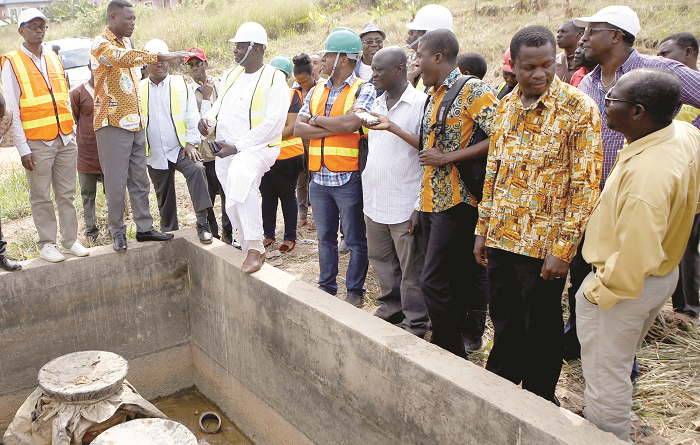Rehabilitation works begin on Weija Irrigation Scheme(Dec 17, 2016)
Rehabilitation works have begun on the Weija Irrigation Scheme which was destroyed by the June 3, 2015 torrential rains that caused severe flooding within the catchment area of the scheme.
Currently, more than half of the canal hasß been covered and desilting is ongoing.
Work underway
Meanwhile, the beneficiary farmers, who are mainly members of the Weija Water Users Association, have been engaged to use shovels to remove the remaining silt that could not be removed by the excavators.
Additionally, surveyors of the Ghana Irrigation Development Authority (GIDA) are pegging and checking levels for subsequent laying of pipes from the Weija Dam to Tuba where most of the farmers are located.
Apart from displacing people in the area, the June 3, 2015 flood also damaged foodstuff, livestock,
farmlands, irrigation systems, food storage and processing facilities throughout the Greater Accra Region.
Similar rehabilitation works are ongoing at the Ashaiman and Dahwenya Irrigation schemes which are being funded with $500,000 from the Food and Agriculture Organisation (FAO), as well as technical assistance. The FAO support was in response to a request by the Ministry of Food and Agriculture.
The Weija Irrigation Scheme supplies water to farmers in the Greater Accra Region to produce vegetables to feed Accra and parts of the Central Region.
During an inspection tour of the project by officials of the FAO and GIDA at Weija yesterday, engineers working on the project said running water and mud from the Akoasa Mountain, near the tollbooth at Tuba, ended up in the canals during the rainy season because human activity there had disturbed the vegetation.
Protect facilities
At a meeting with the farmers, the FAO Representative for Africa, Mr Bukar Tijani, urged the farmers to continue to contribute to safeguarding the project as it had the potential to create wealth for them.
“We are partners in development and there are many things you can do with this project. You can create millions of cedis from this project for yourselves and you don’t have to depend on the government or the FAO. You can desilt canals without government support and you can also protect them from destruction,” he said.
Pleas
The Secretary of the Weija Water Users Association, Mr Timothy Quaye-Huago, was full of appreciation to the FAO for its support, saying even before the floods, the silt was a major problem, and pledged the group’s commitment to protect the facility and the area from encroachment.
He, however, called for assistance to increase the capacity of the pump that supplied water to their farms because he said during the dry season, the current pump was not able to meet their demands, compelling the farmers to cultivate only a quarter of their lands.
He said the situation defeated the purpose of irrigation as it was meant to be done in the dry season too.
Mr Quaye-Huago also complained about electricity tariff, saying farmers had petitioned Parliament to look into it.
Responding to the concerns, the Chief Executive of GIDA, Dr Benjamin Vas Nyamadi, said Parliament had directed the authority to meet with the Public Utilities Regulatory Commission to find a long-lasting solution to the farmers’ concerns.
On the issue of land, he said the government had not issued titles to most of the developers, and added that before the end of the year, there would be a meeting among the farmers, GIDA and residents/developers to agree on where vehicles could pass or otherwise to prevent damage to the irrigation pipelines.


Comments
Post a Comment